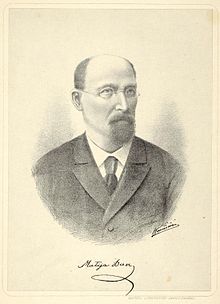Matija Ban
| Matija Ban | |
|---|---|
 |
|
| Born |
16 December 1818 Petrovo Selo, Dubrovnik, Kingdom of Dalmatia, Austrian Empire |
| Died | 14 March 1903 (aged 84) Belgrade, Kingdom of Serbia |
| Occupation | writer, diplomat |
| Notable works | Cvijeti Srbske (1865); Vanja (1868) |
Matija Ban (Serbian Cyrillic: Матија Бан; 1818–1903) was a Serbian poet, dramatist, and playwright, born in the city of Dubrovnik, who became known as one of the first Catholics from Dubrovnik who expressed a Serb nationality. He settled in Serbia in 1844, and engaged in various diplomatic missions in service of the Principality of Serbia.
Ban was a strong advocate of Serbian unity and independence, but was also a pan-Slavist. He is commonly regarded as being the first to use the term "Yugoslav", in a poem in 1835.
Matija Ban was born in Petrovo Selo, near the city of Dubrovnik (in today's Croatia), to a Roman Catholic family. After graduating from a lycee in Dubrovnik, he was supposed to join the Franciscan order, but suddenly changed his plans. His inquisitive mind and wanderlust made him travel to the East. He first lived and worked on the island of Halki (Heybeliada), near Istanbul (Constantinople); Bursa; and the metropolis of Constantinople. He also had an estate in Anatolia, Asia Minor, where he spent his holidays.
Matija Ban was influenced by pan-Slavists and romantic nationalists Michał Czajkowski and František Zach in Istambul, so much that he moved to Belgrade in 1844 in an attempt to promote his idea that Serbian patriotism must extend beyond Serb Orthodoxy and the borders of the Principality of Serbia.
...
Wikipedia
